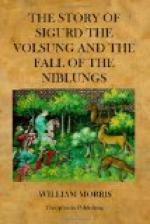But the wine-drenched earls
were awaking, and the sleep-dazed warriors
stirred,
And the light of their dawning
was dreadful; wild voice of the day
they heard,
And they knew not where they
were gotten, and their hearts were
smitten with dread,
And they deemed that their
house was fallen to the innermost place of
the dead,
The hall for the traitors
builded, the house of the changeless plain;
They cried, and their tongues
were confounded, and none gave answer
again:
They rushed, and came nowhither;
each man beheld his foe,
And smote as the hopeless
and dying, nor brother brother might know,
The sons of one mother’s
sorrow in the fire-blast strove and smote,
And the sword of the first-begotten
was thrust in the father’s throat,
And the father hewed at his
stripling; the thrall at the war-king
cried,
And mocked the face of the
mighty in that house of Atli’s pride.
There Gudrun stood o’er
the turmoil; there stood the Niblung child;
As the battle-horn is dreadful,
as the winter wind is wild,
So dread and shrill was her
crying and the cry none heeded or heard,
As she shook the sword in
the Eastland, and spake the hidden word:
“The brand for the flesh
of the people, and the sword for the King of
the world!”
Then adown the hall and the
smoke-cloud the half-slaked torch she
hurled
And strode to the chamber
of Atli, white-fluttering mid the smoke;
But their eyen met in the
doorway and he knew the hand and the stroke,
And shrank aback before her;
and no hand might he upraise,
There was nought in his heart
but anguish in that end of Atli’s days.
But she towered aloft before
him, and cried in Atli’s home:
“Lo, lo, the day-light,
Atli, and the last foe overcome!”
And with all the might of
the Niblungs she thrust him through and fled,
And the flame was fleet behind
her and hung o’er the face of the dead.
There was none to hinder Gudrun,
and the fire-blast scathed her nought,
For the ways of the Norns
she wended, and her feet from the wrack they
brought
Till free from the bane of
the East-folk, the swift pursuing flame,
To the uttermost wall of Atli
and the side of the sea she came:
She stood on the edge of the
steep, and no child of man was there:
A light wind blew from the
sea-flood and its waves were little and
fair,
And gave back no sign of the
burning, as in twinkling haste they ran,
White-topped in the merry
morning, to the walls and the havens of man.
Then Gudrun girded her raiment,
on the edge of the steep she stood,
She looked o’er the
shoreless water, and cried out o’er the measureless
flood:
“O Sea, I stand before
thee; and I who was Sigurd’s wife!
By his brightness unforgotten
I bid thee deliver my life
From the deeds and the longing
of days, and the lack I have won of the
earth,
And the wrong amended by wrong,
and the bitter wrong of my birth!”




